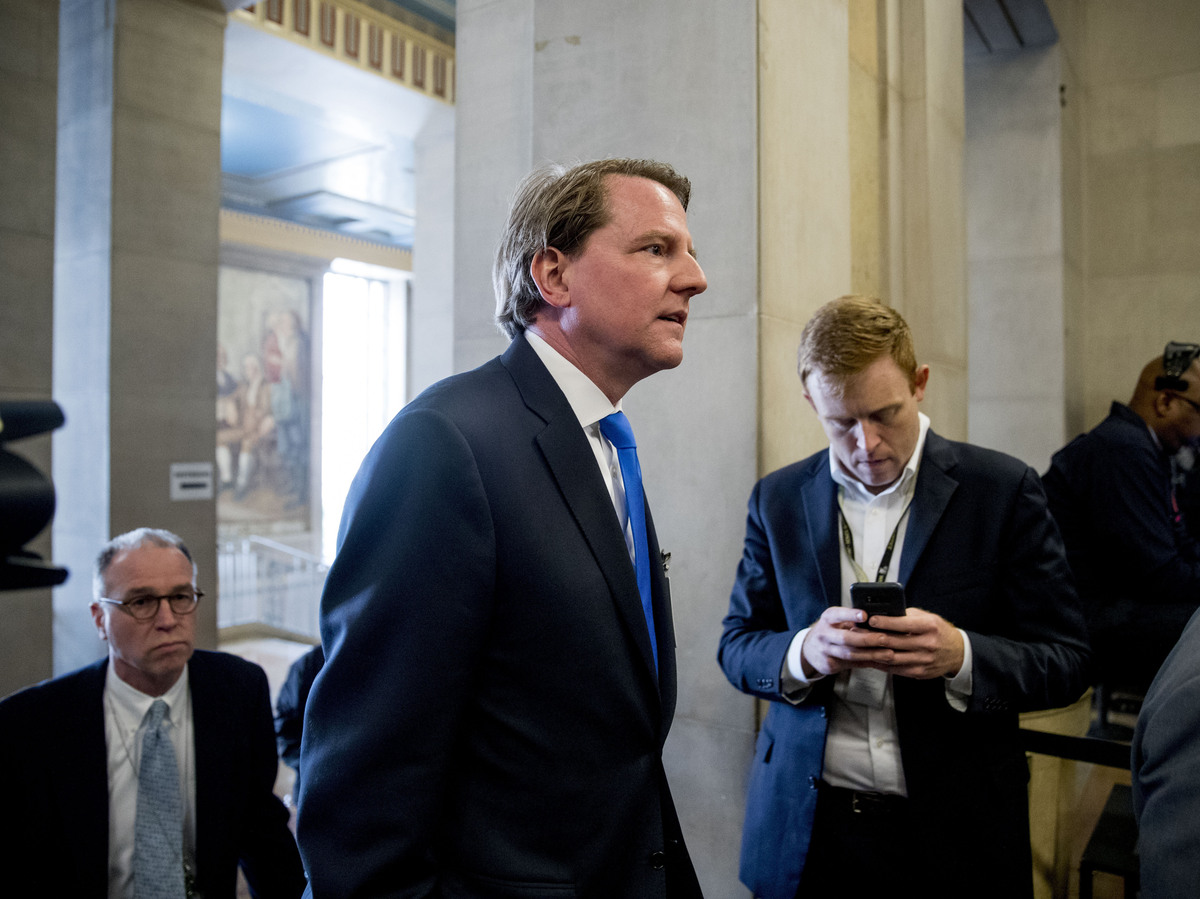
On Monday, a federal judge ruled that former White House counsel Don McGahn must testify to House lawmakers who have subpoenaed him, in the face of White House orders that McGahn not comply. Above, McGahn arrives for an event at the Justice Department in May. Andrew Harnik/AP hide caption
toggle caption
Andrew Harnik/AP

On Monday, a federal judge ruled that former White House counsel Don McGahn must testify to House lawmakers who have subpoenaed him, in the face of White House orders that McGahn not comply. Above, McGahn arrives for an event at the Justice Department in May.
Andrew Harnik/AP
A federal judge in Washington has ruled that former White House counsel Don McGahn must testify to House impeachment investigators, despite orders from the Trump administration that he not cooperate with Congress.
The decision by U.S. District Judge Ketanji Brown Jackson clears the way for McGahn's testimony, sought by House Democrats in exploring Trump's possible obstruction of justice related to the Russia probe.
Jackson declared in her 118-page ruling that "no one is above the law."
She added: "However busy or essential a presidential aide might be, and whatever their proximity to sensitive domestic and national-security projects, the President does not have the power to excuse him or her from taking an action that the law requires."
The ruling could have implications for other key witnesses, such as former national security adviser John Bolton, who has refused to testify until a federal court weighs in on the conflict between Congress and the White House.
The Trump administration is expected to appeal, which could delay McGahn's testimony to House investigators.
Democrats subpoenaed McGahn on May 21, months before the start of the impeachment inquiry. But he is now considered by impeachment investigators to be a central witness to possible instances of obstruction of justice.
House Judiciary Committee Chairman Jerrold Nadler, D-N.Y., celebrated Jackson's decision.
"Now that the court has ruled, I expect him to follow his legal obligations and promptly appear before the Committee," Nadler said in a statement.
White House lawyers have said McGahn is among a small cadre of current and former senior administration officials who cannot be forced to testify about matters related to the president since doing so risks revealing information that is protected under executive privilege. At a hearing last month, a Justice Department attorney said McGahn and other former top White House aides are shielded by "absolute immunity."
Yet Jackson was deeply skeptical about this argument, citing the challenge of enforcing it in light of the high rate of turnover among Oval Office aides. She suggested at the hearing that the legislature would be impeded in carrying out its basic oversight power if lawmakers could not call witnesses as part of an investigation into the president. She called the Trump administration's position that top aides are immune from testifying before Congress "peculiar."
In her ruling on Monday, Jackson said Office of Legal Counsel opinion from the White House, which Trump administration lawyers cited in defense of its "absolute immunity" argument, are not legally binding.
"Thus—to be crystal clear—what is at issue in this case is solely whether senior level presidential aides, such as McGahn, are legally required to respond to a subpoena that a committee of Congress has issued, by appearing before the committee for testimony despite any presidential directive prohibiting such a response," Jackson wrote. "McGahn 'must appear before the Committee to provide testimony, and invoke executive privilege where appropriate.' "
McGahn was seen as the star witness in special counsel Robert Mueller's report on Russian interference in the 2016 election. He told Mueller's investigators that Trump had ordered him to fire Mueller. McGahn told investigators that a day after the revelation broke in the press, Trump asked him to write a letter denying that the president had wanted Mueller fired.
"Each time he was approached, McGahn responded that he would not refute the press accounts because they were accurate in reporting on the President's effort to have the Special Counsel removed," according to Mueller's findings.
McGahn said he would rather quit than fire Mueller. McGahn stepped down as White House counsel in October 2018.
As court battles wage on over witnesses, House Intelligence Committee Chairman Adam Schiff, D-Calif., says lawmakers are now writing a report that summarizes key findings about Trump's alleged pressure campaign on Ukraine.
In a letter on Monday to House lawmakers, Schiff said the witnesses over the past six weeks have presented "overwhelming, unchallenged, and damning" evidence that Trump abused his office by using military assistance approved by Congress to push Ukrainian authorities to open up politically beneficial investigations.
"Over the course of our inquiry, we have uncovered a months-long effort in which President Trump again sought foreign interference in our elections for his personal and political benefit at the expense of our national interest," Schiff wrote.
Schiff said he expects to deliver the report to the House Judiciary Committee shortly after Congress returns from Thanksgiving break.
From there, the Judiciary Committee can draft articles of impeachment.
Schiff said investigators are still open to additional hearings and witness questioning but said lawmakers would not allow what he called the White House's stonewalling of witnesses to slow down the process.
Investigators hoped to hear from acting Chief of Staff Mick Mulvaney, Secretary of State Mike Pompeo and Bolton, but because the White House prevented them from appearing, House investigators will now consider the Trump administration's blocking of the witnesses a type of obstruction that "demonstrates consciousness of guilt on the part of the President," Schiff said.
Earlier on Monday, Trump tweeted, "Support for Impeachment is dropping like a rock." The president has repeatedly slammed the impeachment inquiry as a "phony" and "sham" process that lacks evidence and is politically motivated.
NPR's Ryan Lucas contributed to this report.
